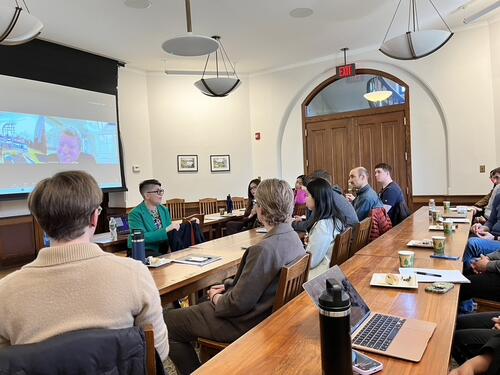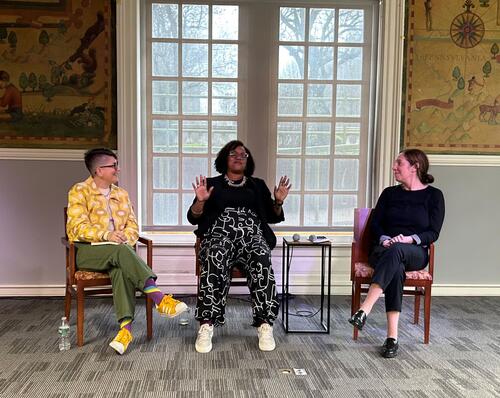“When in doubt,” Annalee began, “don’t kill anyone.”
The inaugural “Sci X Sci-Fi” series, organized by Yale Planetary Solutions, kicked off with a reading by science fiction author and science journalist Annalee Newitz. Their novel The Terraformers takes place on a planet far away, 50,000 years in the future. There, an experiment is unfolding: the creation of a pristine Pleistocene ecosystem that mimics Earth’s from long ago. Examples of resilient and sustainable technologies abound in the book, from buildings that grow plant-like on trellises to hyper-efficient mass transit. Conflict ensues, however, when galactic corporations get involved in selling and developing the meticulously balanced environment.

Supported by a Poynter Fellowship in Journalism, Annalee’s visit aimed to inspire the community to envision a sustainable future, foster hope, and spark ideas across 11 discussions, dinners, workshops, and seminars this spring. The kickoff reading led into a conversation between Annalee and Carl Zimmer, New York Times writer and Yale lecturer, exploring how creative arts can inspire real-world change. Throughout the week, approximately 240 Yale students, faculty and staff, and New Haven community members engaged in series events, with participants’ disciplines spanning engineering, sociology, anthropology, history, chemistry, and more.
One responsibility of writers, Annalee remarked throughout the week, is to help people empathize with – and therefore become invested in – humans of the future. Equally important, they said, is that world builders think about the framing they offer audiences; narrative construction can influence public sentiment and policy decisions.
“Do you start the story with planting the trees or with cutting the trees down?” Annalee asked in response to a question from the audience. “Because where you start that story gives you two different mathematical models of what it means to be carbon neutral. This is deeply important to how we’re imagining the future, both politically and environmentally…how you move that framing means everything.”
Rather than taking a simple “burn it all down” approach common in many dystopian narratives, Annalee emphasized the importance of imagining how we build innovative policies and technologies instead, citing science fiction as a tool that helps people focus on creating this new, better future.
“The decisions we make now are going to create a new tomorrow and people will live in it,” said Annalee in the opening conversation. “Science fiction can give us human beings that we relate to, that we identify with, that are in that future and make us care…we want to make the world habitable for them.”

The largest event of the week was co-organized by the School of the Environment, leveraging their weekly BIOMES seminar. Annalee’s lecture, titled Avoiding Dystopia in Theory and Practice, explored ways for scientists to think about storytelling and have fun dreaming up creative solutions. The talk centered on examples of innovative problem-solving enabled by fictional storytelling, such as Boston’s “Emerald Tutu” which, Annalee explained, might not have been imagined without the fantasy aesthetic known as “goblin core.”
The talk offered several specific tools to enable scientists who want to get a fresh perspective on sustainability challenges.
“Something that science fiction does really, really well is defamiliarization,” said Annalee. “You take topics that people hear about all the time like climate change, pandemics, or resource allocation – topics that in the headline of a newspaper might cause people to shut down – and create an imaginative sandbox and say like, but imagine if we were on another planet with flying talking moose? You put people into an alternate reality, and it allows them to think about problems in a new way.”
Students had several opportunities to build skills as part of Sci X Sci-Fi. The Green Chemistry and Engineering Pitch Breakfast, co-organized with Hanno Erythropel at the Center for Green Chemistry and Green Engineering, provided an opportunity for students to distill their highly technical work into one-to-two-minute elevator pitches. The room buzzed with excitement as students shared their projects in new, creative ways, like comparing sorting the right molecules out of wastewater to picking out only one color of M&M’s. Likewise, students in Rebecca Kramer’s soft robotics lab, also known as “The Faboratory,” had read the first two chapters of Annalee’s forthcoming, robot-centric novella Automatic Noodle. They were eager to present their latest creations and engage with Annalee about the technology they have in development. Annalee also offered a world-building workshop to Lisa Messeri’s “Anthropology of Outer Space” class.

Sci X Sci-Fi concluded with a panel discussion at the New Haven Free Public Library, where Dawn Ragsdale, executive director at the Center for Inclusive Growth, Julie Zimmerman, Vice Provost for Planetary Solutions, and Annalee discussed the need for collaboration and diversity to advance planetary solutions. The panel provided an exciting opportunity to collaborate with the public library and bring the event to more community members.
“What science fiction does effortlessly is remind us there’s always another possibility, always another place we can go,” Annalee said, “Fiction, fantasy, and speculative fiction are a reminder that we always live at a moment where we can make many possible choices and enter into many possible worlds.”
Newitz highlighted the importance of exploring these nuanced possible futures – rather than gravitating toward complete utopia or dystopia – and considering how to engage in problem solving in imperfect settings.
“One thing fiction can do is offer us models of a coming world that aren’t all bad or all good,” Annalee said during their visit. “That is the world where we can solve problems.”
________
Stay tuned for the next edition of Sci X Sci-Fi in the ‘25-‘26 academic year, with more exciting, interactive, hope-building programming! Sign up for our newsletter to get the latest updates.
Image Captions:
1) Annalee Newitz presents, “Avoiding Dystopia: In Theory and Practice,” at the weekly BIOMES seminar in Kroon Hall
2) Chemistry and engineering students in discussion with Annalee after presenting their research in the form of elevator pitches
3) (Left to Right) Julie Zimmerman, Dawn Ragsdale, and Annalee Newitz in conversation at the New Haven Free Public Library